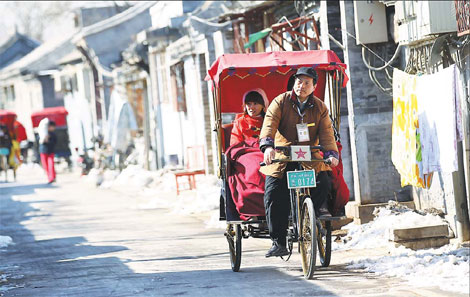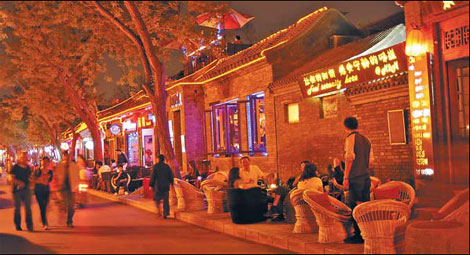Culture
Riding the noisy wheels of progress
By Wu Wencong (China Daily)
Updated: 2011-02-23 07:47
 |
Large Medium Small |
|
Rickshaw rider Li Gang says he has seen Shichahai develop quickly over the last decade into an area that has gained some great facilities but lost a sense of its tranquility. [Photo/ China Daily] |
Resident of Shichahai recalls how it has been transformed in a decade
Shichahai is among the city's best-preserved historical sites. Over the past decade, the community and the people living in it have witnessed magnificent changes in the area: some good, some not so good.
Li Gang, a 40-year-old rickshaw rider who has shuttled visitors back and forth through the hutong of Shichahai for years, has a unique and personal perspective on the modernization.
Li's family moved to Beiguanfang Hutong in 2000. The family of three has been living in the same 18-square-meter room since, as part of a compound that holds nine families.
Li recalled when the lakeside stretch was lined with households, not bars. He said it all started to change in 2003 when most of the riverfront houses, which have decades of history, were rented out and turned into bars and coffee shops. Tourists started to trickle into the area and this boosted business for rickshaw riders offering hutong tours, but everything was a shambles.
"There was no management at all," said Li. "The riders set prices on their own and then competed to win customers, but it sometimes led to fights."
The confusion did not last long. As the 2008 Beijing Olympic Games drew closer and the number of tourists climbed higher, the riders were united, trained and managed.
Dozens of Li's friends and neighbors threw themselves into tourism services, from rickshaw riders to running homestay bungalow hostels - housing prices were about 4,000 yuan per square meter, though they have hit around 70,000 now. Li's monthly income had also increased from almost nothing to around 3,000 yuan.
At the end of 2007, about one-fourth of the 40,000 households in Shichahai community said farewell to coal-fire stoves and welcomed electric radiators after the municipal government made a move to promote clean energy in the city center. Li's compound was among the first to experience the change.
"Storing coal for the winter is an exhausting and dirty job," he said. "I choke when the stove is lighted and have heard of many deaths caused by poisoning."
With the introduction of electric radiators, Li said his home's temperature could now climb higher than before, up to 19 C from its previous peak of 15 C.
The renovation work was done for free throughout the area and was considered so successful that in the following year another 26,000 households followed suit. By the end of 2009, Shichahai community had replaced all its coal-fire stoves.
With this renovation work, other updates such as altering the water supply and updating drainage pipes were also made.
"The nine families in the courtyard house used to share one tap," said Li. "Now each has their own."
Power transmission systems were also improved. Li said the courtyard house's previous system was so weak it couldn't run a single air conditioner.
"The courtyard would blow a fuse when anyone tried to run one, but now all nine homes can turn theirs on at the same time," he said.
Li said the changes were mostly positive but he still misses the peace and quiet that Shichahai was once renowned for. With fewer bars, visitors might get more interested in the hutong.
"Shichahai is charming because of its historical and cultural value, made stronger by the people who live here," he said, adding that his job as a rickshaw rider helps promote the area.
"I'm proud of what I do because I can retell stories of the area, just like a father does to his son," he said.
"Living in a compound is much more fun than living in a building. We can drop around casually, play chess in the summer and help out lost tourists."
|
Bars line the street at Shichahai, which incorporates the popular Houhai bar area. provided to China Daily |
| 分享按钮 |

